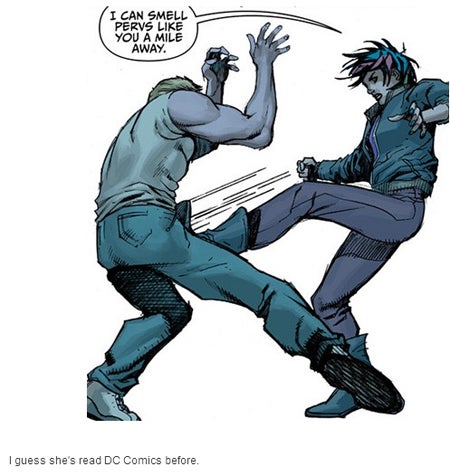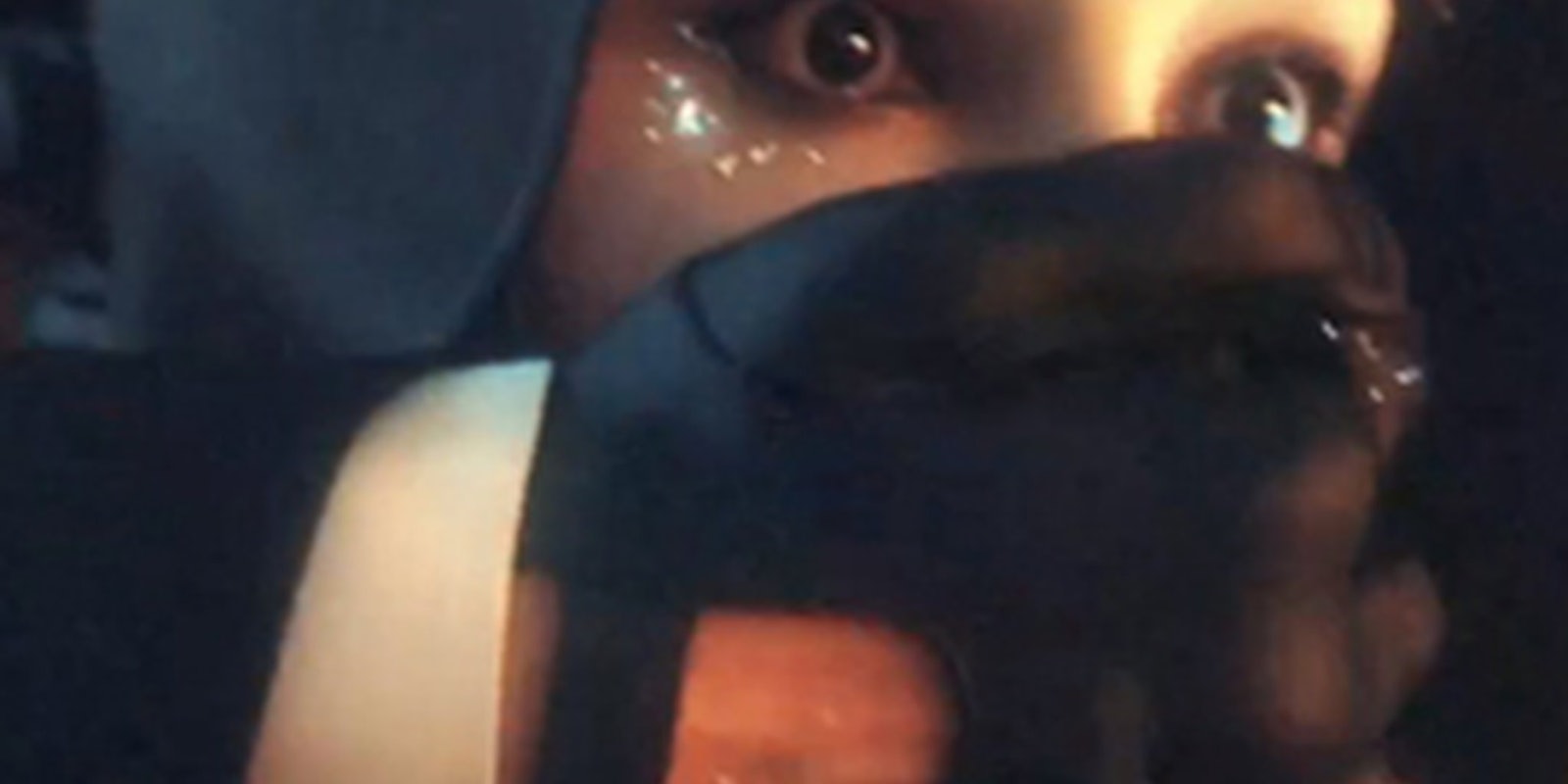The Daily Dot has spent a considerable amount of time this year reporting incidents of sexism, misogyny, and attacks on women that have occurred throughout the gaming and comics industries this year. These are two often-overlapping mainstays of geek culture that have traditionally been seen as male-only spaces and are plagued with severe systemic gender inequality.
A noted essay by gamer girl Lucy Gillam argued in 2005 that within gaming fandom, “true gender equality is actually perceived [by male gamers] as inequality.” Seven years later, women account for 47 percent of gamers and actually comprise a majority of the membership of some gaming and comics fandoms.
Yet they are far from having equal representation among either creators, producers, or characters in the media they’re consuming. One game developer appeared to actively exclude certain female demographics from its recruitment efforts, while DC Comics’s percentage of female writers and artists fell at one point to a jawdropping 1 percent. All the while, some male geeks have grown more and more threatened by the increasing presence of women in their communities.
Geeks have previously seen major blowups like the 2010 Dickwolves incident and the 2011 Comic Con Batgirl controversy. Blogs like Fat, Ugly, or Slutty have tracked sexism across geek culture for a while now. But in 2012, there seemed to be new cause for alarm at every turn, with characters getting raped, players getting harassed, and critics getting death threats.
2012 was truly not a good year for female geeks. Here’s how the year looked on a month-by-month basis.
February
-
Female game designer Meg Stivison blogs about the widespread unwillingness to acknowledge women as an increasing force within the industry.
-
Gaming industry insider Jennifer Hepler receives death threats after comments she made on gaming five years ago appear on Reddit.
- Capcom’s livestreamed Cross Assault gaming event subjects player Miranda Pakozdi to ongoing sexual harassment by her own team coach, who later declares that sexual harassment is just a part of the fighting game culture.
March
-
Forbes writer Tara Tiger Brown requests that “Fake geek girls” “do everyone a favor and call yourself what you are: a casual hobbyist.”
April
-
The Oatmeal draws fire for a comic implying that women are treated to a different, nicer standard of behavior in live gameplay than men. “aaaaaaaaactually, in my experience,” wrote Tumblr user starwards, “it tends to be more like if I make a mistake, i’m representing my entire gender, am lampooned mercilessly, and reminded that all girls suck at playing games.”
May
-
The newest trailer for Square Enix’s game Hitman: Absolution lets us all enjoy the brutal and titillating murder of sexually objectified nuns.
June
-
Tomb Raider’s iconic Lara Croft gets turned into a helpless rape victim in order to increase the “protectiveness” of her (presumably male) target audience.
-
Reporter Katie Williams writes about having her gamer status repeatedly questioned and dismissed while trying to demo games at gaming con E-3.
-
Also at E-3, several women within the gaming industry speak anonymously about being ignored and having their criticisms and points of view overlooked by the male game designers they work with.
June-July
-
Feminist Frequency’s Anita Sarkeesian receives an intense backlash of death and rape threats, defamation, hate speech, and even a short-lived game dedicated to punching her in the face, all because she started a Kickstarter project documenting sexism in video games. The upside? The Kickstarter nearly $160,000. The harassment is ongoing.
July
-
A Destructoid writer publicly questions the validity of Felicia Day’s geek girl status.
-
The Destructoid writer loses his job, but he is echoed just weeks later by contributors to CNN’s GeekOut! blog. The first, Rob Salkowitz, posits a divide between Twilight fans and gamers at ComicCon, as if no overlap was possible; the second, Joe Peacock, echoes Brown in lambasting the presence of “booth babes” and fake girl gamers.
-
Actor Simon Pegg comes under fire for objectifying cosplayers at Comic-Con.
-
Comic artist Kate Leth of Kate or Die sparks a discussion about women being belittled in comic bookshops when she has a dismissive encounter in her local store.
August
- The lead designer of Borderlands calls the secondary player mode of the new Borderlands 2 game the “girlfriend mode,” meaning “a new option to allow inferior gamers to play co-op with more skilled players.”
September
-
Popular blogger DC Women Kicking Ass speaks out against ongoing online harassment she and other female comic artists have endured.
-
A study of gender inequality in gaming reveals significant issues of sexism, including the fact that nearly 70 percent of women polled had concealed their gender in order to avoid harassment.
-
DC’s Sword and Sorcery reboots a series called Amethyst, ditches some major components but includes a graphic attempted gang rape of a female character. At Comics Alliance, Chris Sims writes:
“It’s not that it’s not an abhorrent cliché that sums up everything that’s wrong with their line in one tidy scene, because it certainly is that, it’s that this just seems to be how it is now. Rape and rape threats have become a cornerstone of the DC Universe. Complaining about it at this point is like complaining about Marvel having a bunch of comics about mutants. It’s just something they do in their books because they don’t know any other way to tell stories.”

Screengrab via Comics Alliance
October
-
Black Cat cosplayer Mandy Caruso is sexually harassed in front of a large crowd during a filmed interview while attending New York Comic Con.
November: Finally, some signs of change?
-
The creators of Halo 4 announce a lifetime ban on the game’s servers for anyone engaging in harassment or defamatory behavior against women and other minorities
-
Zelda player reprograms the game with gender-swapped language so that his three-year-old daughter can be the hero of the story.
-
After a Twitter user queries, “why are there so few lady game creators?” the revealing hashtag #1reasonwhy trends for hours as thousands of women in the industry and other female gamers and geeks share their experiences of being ostracized, harassed, and silenced.
-
Marvel comics broke records by hiring more women professionally than any month in previous history, to raise the tally to a whopping… 14 percent.
…or maybe not.
-
Respected comic artist Tony Harris posts an enormous screed against “fake geek girls” to Facebook. Previous “fake geek girl” ranter Joe Peacock agrees with him. The same day, comic creator Dirk Manning posts his own Facebook screed against the “fake geek girls” of comics fandom.
December
-
The Hawkeye Initiative takes off as the latest iteration of the “Strong Superhero Pose” meme, which critiques the ridiculous, anatomically impossible poses women in comics are frequently drawn in, in order to fully objectify them.
-
DC Comics removes popular, outspokenly feminist author Gail Simone from her financially successful series Batgirl, an inexplicable decision considering how well her issues were doing.
-
In case we didn’t get enough nun-killing in May, Hitman: Absolution comes back with a thankfully short-lived Facebook app that not only allowed you to send death threats to all your Facebook friends but lets you target women for murdering based on specific reasons, including “Her awful make-up, her hairy legs, her small tits.”
Taken together, it was an embarrassing and frustrating year in geek culture. But as the events in November illustrated, there were a few glimmers of hope.
Here’s hoping they shine even brighter in the new year.
Correction: The original version of this story stated Anita Sarkeesian’s Kickstarter campaign raised $600,000. The correct amount was $158,922. We regret the errior.
Screengrab via Hitman: Absolution/YouTube


